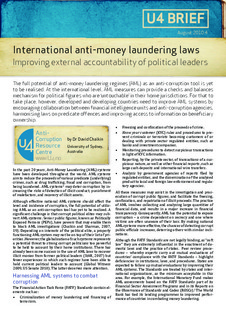| dc.contributor.author | Chaikin, David | |
| dc.date.accessioned | 2018-01-04T08:16:31Z | |
| dc.date.available | 2018-01-04T08:16:31Z | |
| dc.date.issued | 2010-08-27 | |
| dc.identifier | oai:www.cmi.no:3775 | |
| dc.identifier.citation | Bergen: Chr. Michelsen Institute (U4 Brief 2010:4) 4 p. | |
| dc.identifier.uri | http://hdl.handle.net/11250/2474639 | |
| dc.description.abstract | The full potential of anti-money laundering regimes (AML) as an anti-corruption tool is yet to be realised. At the international level, AML measures can provide a checks and balances mechanism for political figures who are ‘untouchable’ in their home jurisdictions. For that to take place, however, developed and developing countries need to improve AML systems by encouraging collaboration between financial intelligence units and anti-corruption agencies, harmonising laws on predicate offences and improving access to information on beneficiary ownership. | |
| dc.language.iso | eng | |
| dc.publisher | Chr. Michelsen Institute | |
| dc.relation | U4 Brief | |
| dc.relation | 2010 No 4 | |
| dc.relation.ispartof | U4 Brief | |
| dc.relation.ispartofseries | U4 Brief 2010 No 4 | |
| dc.relation.uri | https://www.cmi.no/publications/3775-international-anti-money-laundering-laws-improving | |
| dc.subject | International Drivers of Corruption | |
| dc.subject | Uncac | |
| dc.title | International anti-money laundering laws. Improving external accountability of political leaders | |
| dc.type | Report | |
